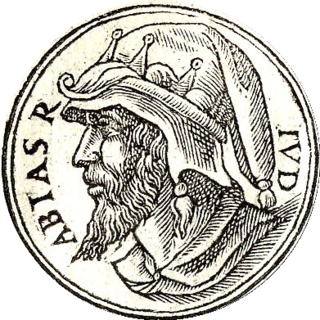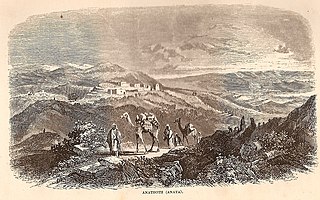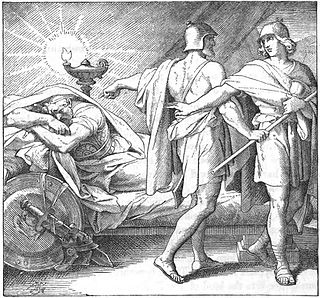Related Research Articles
Abijah is a Biblical Hebrew unisex name which means "my Father is Yah". The Hebrew form Aviyahu also occurs in the Bible.

Abimelech was the generic name given to all Philistine kings in the Hebrew Bible from the time of Abraham through King David. In the Book of Judges, Abimelech, son of Gideon, of the Tribe of Manasseh, is proclaimed king of Shechem after the death of his father.
Zephaniah is the name of several people in the Hebrew Bible and Jewish Tanakh; the most prominent one being the prophet who prophesied in the days of Josiah, king of Judah and is attributed a book bearing his name among the Twelve Minor Prophets. His name is commonly transliterated Sophonias in Bibles translated from the Vulgate or Septuagint. The name might mean "Yah has concealed", "[he whom] Yah has hidden", or "Yah lies in wait".

Abijam was, according to the Hebrew Bible, the fourth king of the House of David and the second of the Kingdom of Judah. He was the son of Rehoboam and the grandson of Solomon. The Books of Chronicles refers to him as Abijah.
Ahijah is a name of several biblical individuals:
- Ahijah the Shilonite, the Biblical prophet who divided the Kingdoms of Israel and Judah.
- One of the sons of Bela. In AV (KJV) called "Ahiah."
- One of the five sons of Jerahmeel, who was great-grandson of Judah.
- A Pelonite, one of David's heroes ; called also Eliam.
- A Levite having charge of the sacred treasury in the temple.
- One of Solomon's secretaries.
- Son of Ahitub, Ichabod's brother; the same probably as Ahimelech, who was High Priest at Nob in the reign of Saul and at Shiloh, where the Tabernacle was set up. Some, however, suppose that Ahimelech was the brother of Ahijah, and that they both officiated as high priests, Ahijah at Gibeah or Kirjath-jearim, and Ahimelech at Nob.
- Father of King Baasha of Israel

Ahimaaz was son of the high priest Zadok.
There were four biblical characters called Amasai.

Anathoth is the name of one of the Levitical cities given to "the children of Aaron" in the tribe of Benjamin. Residents were called Antothites or Anetothites.
Annas was appointed by the Roman legate Quirinius as the first High Priest of the newly formed Roman province of Judaea in AD 6 – just after the Romans had deposed Archelaus, Ethnarch of Judaea, thereby putting Judaea directly under Roman rule.
Zerah or Zérach refers to several different people in the Hebrew Bible.
Uzzi is a given name. One derivation is biblical, from Uzzî meaning "my strength". The name can also be transliterated as Uzi. It may be a nickname for Uzza/Uzzah, Uzzia/Uzziah, and Uziel/Uzziel.

According to the Tanakh, עזה, Uzzah or Uzza, meaning "Her Strength", was an Israelite whose death is associated with touching the Ark of the Covenant. The account of Uzzah appears in two places in scripture: 2 Samuel 6:3-8 and 1 Chronicles 13:7-11.
Nethaneel - נתנאל "Gift of/is God", Standard Hebrew Nətanʾel, Tiberian Hebrew Nəṯanʾēl, also Nethanel:
- The son of Zuar, chief of the tribe of Issachar and one of the leaders of the tribes of Israel during the Exodus.
- One of David's brothers.
- A priest who blew the trumpet before the ark when it was brought up to Jerusalem.
- A Levite.
- A temple porter, of the family of the Korhites.
- One of the "princes" appointed by Jehoshaphat to teach the law through the cities of Judah.
- A chief Levite in the time of Josiah.
- A son of Passhur, one of the biblical priests who had taken a pagan wife but repented according to Ezra 10:22.
- Neh. 12:21.
- A priest's son who bore a trumpet at the dedication of the walls of Jerusalem.

Joab the son of Zeruiah, was the nephew of King David and the commander of his army, according to the Hebrew Bible.
Hadadezer, son of Rehob, was king of Zobah, a Syrian (Aramaean) kingdom that may have been in the Beqaa valley of Lebanon, extended along the eastern side of the Anti-Lebanon Mountains reaching Hamath to the north. The kingdom of Zobah exercised power throughout southern Syria, and inevitably clashed with the expanding empire of Israel.
Abishur is one of the two sons of Shammai of the Tribe of Judah.

Abishai was a military leader under the biblical King David. He was the eldest son of David's sister Zeruiah. According to Josephus his father was called Suri. The meaning of his name is "Father of a gift". He was the brother of Joab and Asahel,
Ahitub was a High Priest of Israel cited in the Bible.
References
![]() This article incorporates text from a publication now in the public domain : Easton, Matthew George (1897). "Ahio". Easton's Bible Dictionary (New and revised ed.). T. Nelson and Sons.
This article incorporates text from a publication now in the public domain : Easton, Matthew George (1897). "Ahio". Easton's Bible Dictionary (New and revised ed.). T. Nelson and Sons.